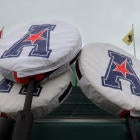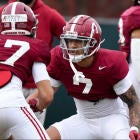Scheduling matters more than ever before in the College Football Playoff era. As we've seen in the short history of the CFP, it's one of the biggest factors in deciding who gets a shot to play for a national title and who does not. It's not just whether you win your conference but who you play along the way. It's also proven that it's not just about who you have beaten, but who you lost to during the season.
Nobody should have a better understanding of this idea than UCF. When I ranked American Athletic Conference schedules last year, UCF's checked in with the No. 10 schedule in the conference. Only South Florida and Memphis had what were considered "easier" schedules. I don't think any of us realized at the time how big a storyline UCF's schedule would end up being, but after its game against Georgia Tech was canceled due to a hurricane, UCF never had a chance of earning a playoff berth.
Methodology: It's hard to know with any certainty seeing as how the season doesn't start for another few months, and while no process is perfect, this one provides a good overview. I took a look at how every team performed over the last five years in my ranking system. While there are always exceptions, teams tend to find their level over a longer time span, hence the five-year period. I then considered other factors like whether a game is on the road, or if a team is coming off a bye week, allowing them extra time to get healthy and prepare. I put all this information together and came out with a ranking system I believe to be fairly accurate.
Here's how the 12 teams of the AAC stack up against one another from a schedule difficulty perspective, ranked from toughest to easiest.
| 1 | |
| Sonny Dykes has taken over for Chad Morris, and he's walking into a hornet's nest in his first season. The Mustangs open the year with a road trip against a North Texas team that won its division last season, and that game is followed by a home game against TCU and a road trip to Michigan. SMU also draws a game with UCF out of the East Division. The good news is Houston, Memphis and Navy all come to Dallas. | |
| 2 | |
| Tulane, home of the best logo in college football and one of the toughest schedules in the AAC. The Green Wave open the year with Wake Forest at home, and then after a couple of games against Nicholls and UAB it's a road trip to Ohio State. The Green Wave draw a road trip against USF from the East and in the division get both Navy and Memphis at home with Houston on the road. | |
| 3 | |
| If the Pirates are going to bounce back from a 3-9 2017, it won't be easy. The nonconference includes two ACC games against North Carolina (at home) and at Virginia Tech. They also draw both Houston and Memphis from the West, though both are at home. Within the division, ECU will play UCF at home but must head on the road for both USF and Temple. | |
| 4 | |
| Navy is always going to have a somewhat difficult schedule due to rivalry games outside the AAC. The Mids have their annual tilts with Air Force, Army and Notre Dame, as well as a road trip to Hawaii to open the season. While they get both Memphis and Houston at home this year, it's counterbalanced by having to go on the road to take on UCF. | |
| 5 | |
| From the looks of it, Tulsa is going to have a hard time winning games outside of Tulsa this season. The road schedule consists of Texas, Temple, Houston, Arkansas, Memphis and Navy. On the other side, that means the home schedule is a bit more manageable, so there's a good chance this team can improve on last season's two wins. | |
| 6 | |
| Temple's nonconference schedule features a few tough games, as the Owls will go on the road for both Maryland and Boston College. Still, the real challenge will be inside the division. The Owls get UCF, Houston and Navy on the road, though USF will come to Philly. | |
| 7 | |
| The good news for UCF is that should it go 13-0 again it'll have additional credibility with the CFP thanks to last season. The bad news is that, even if it looks stronger than last season's, this year's schedule still doesn't offer many chances for marquee wins. A road game against North Carolina and a home date against Pitt is nice, but the Knights will need both of them to have strong seasons to give the ol' resume a boost. Inside the AAC, the Knights draw Memphis and Navy from the West and will get USF on the road to finish the season. | |
| 8 | |
| Having games against Arizona and Texas Tech helps Houston's nonconference SOS, but it's countered by games against Rice and Texas Southern. Having to play both Navy and Memphis on the road will provide a challenge within the division as will having both USF and Temple coming out of the East to play in Houston. | |
| 9 | |
| UConn is in a similar situation as Houston with its nonconference. Road trips to Boise State and Syracuse are respectable enough, but the games against Rhode Island and UMass cancel them out for the most part. Also, all things considered, drawing Memphis, Tulsa and SMU out of the West is as soft a landing you can hope for realistically. | |
| 10 | |
| The Bearcats are held down more by their nonconference schedule than anything. Opening with UCLA on the road is nice, but that's followed up with Miami (Ohio), Ohio and Alabama A&M. | |
| 11 | |
| Having a nonconference game against Illinois is good in theory, considering Illinois is a Big Ten school, but it's just that Illinois is one of the weaker Power Five schools. A home game with Georgia Tech helps a bit, but neither Elon or UMass are going to boost your SOS any time soon. Where things pick up steam is late in the year when USF will have to play at Houston, at Cincinnati, at Temple and home against UCF in the final five weeks. | |
| 12 | |
| Simply put, Memphis' nonconference schedule isn't going to impress anybody. A road game against Missouri in mid-October is nice, but the rest of it includes Mercer, Georgia State and South Alabama. The final nail in the SOS coffin is that Memphis' AAC schedule only includes one difficult road game: Navy. UCF, and Houston both come to Memphis. | |

































